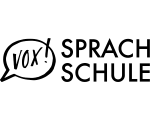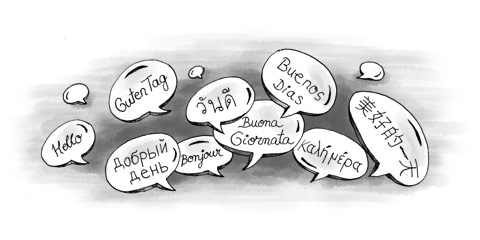In principle, all four languages have equal rights. In practice, however, things sometimes are different since the smaller groups, although geographically fairly homogeneous, often have to assert their political and economic influence. The Federal Constitution stipulates that German, French, and Italian are Switzerland's official languages, whereas Romansh is an official language for communicating with Romansh-speaking persons. German, French and Italian enjoy equal status in Parliament, the federal administration and the army.
Today, languages are distributed as follows: (Swiss-)German 63.9%, French 19.5%, Italian 6.6%, Romansh 0.5%, others 9.5%. Cantonal school regulations require that every child learn a second national language starting in primary school. English is increasingly taught at an early age, sometimes taking priority over a second national language.
Depending where you go, you might need to learn one or multiple local languages (note that some cities like Berne, Fribourg and Valais are officially bilingual). Beware – however – as the ‘Swiss way’ of speaking French or German may be considerably different from what you’re used to.
Swiss German
Swiss German ( Schwytzerdütsch – Suisse-Allemand) is the language spoken in the German-speaking areas and is probably one of the most confusing things for a foreigner coming to Switzerland. It is actually not a single language but a wide variety of local accents and dialects.
If you’ve learned German outside of Switzerland, you will probably not understand a single word if the Swiss speak among each other (even Germans don’t find it that easy). Don’t be too worried about it, due to the variety of dialects, even the Swiss have problems communicating with people from other regions within Switzerland. Even though they may not be that keen on using it, most people have a pretty good command of German Hochdeutsch (literally ‘high German’ and what you will have learnt if you took German in School). Since the Swiss haven’t managed to come up with an official national grammar (there is not even agreement on how to spell ‘ Schwytzerdütsch’), Hochdeutsch is used for written communication.
If you plan to work or study in Switzerland, you will probably get by pretty well with your Hochdeutsch (unless you want to become a local radio or TV presenter). However, you can earn quite some sympathy points by producing some of the Swiss-German gargling sounds and allowing the local to communicate without having to use the ‘strange’ Hochdeutsch. There are some Germans who find the ‘guttural sounds’ of their Swiss neighbours quite engaging.
Swiss French
French is spoken in the cantons of Geneva, Jura, Neuchâtel and Vaud, as well as in parts of the cantons of Bern, Fribourg and Valais. The Romandie (as French-speaking Switzerland is called) also used to have its different dialects especially in rural districts, but these were smoothed out by the joint efforts of the church and schools over the last century.
Today, the French spoken in western Switzerland is almost the same as in France, with a few peculiarities, different words and expressions. One example that actually makes life easier is different numbers from standard French: soixante-dix is septante and quatre-vingt-dix is nonente. If you speak French, you will be understood and understand what people are saying. You may find it takes some time to get the hang of some of the different accents though.
Swiss Italian
Italian is spoken in the southern valleys up to the St.Gotthard, Lukmanier, San Bernardino, Maloja, and Bernina passes. This region comprises the whole of the canton of Ticino and the valleys of Misox/Calanca, Bergell/Bregaglia and Poschiavo in the canton of Graubuenden (Grisons). It is mostly spoken with a Lombardy accent.
The Romansh-speaking Region
The many valleys of Rhaetia (today's Graubuenden/Grisons) were conquered in 15 B.C. by the Romans, and this resulted in the latinisation of the original inhabitants. The isolation of the numerous valleys led to the development of at least five distinguishable idioms besides Italian in three southern valleys - a unique linguistic phenomenon in such a small area with no major cultural and commercial centre. Efforts such as the creation of a single written language known as Rumantsch Grischun have been made to try to stop the erosion process due to migration and tourism. As a foreigner, you will not need to speak Romansch to communicate.




